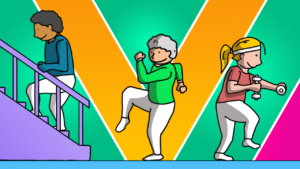Lost muscle mass during COVID lockdown

Millions of people missed out on regular exercise or activity during the Covid-19 pandemic and are likely to have lost muscle mass.
Jumping right back into an activity you haven’t done in a while and expecting to pick up where you left off may lead to unwanted aches and pains.
Muscle loss can lead to long-term problems with mobility and balance, in turn can trigger or aggravate a whole range of health conditions. There are things that you can do to get yourself back active.
Think of movement as an opportunity, not an inconvenience. Be active in as many ways as you can, both incidental activity and some regular, more vigorous exercise for extra health and fitness.
Why is incidental activity important?
Physical activity is a major factor in preventing and reducing the risk of many health conditions eg. heart disease. Physical activity can be accumulated in small amounts through the day or as a single longer session. These two types of activity produce similar health benefits. Also, many people find it easier to be active in lots of little ways throughout the day.. Remember to think of all types of physical activity as a chance to improve your health.
Examples of incidental activity:
- getting up from your desk, shrug your shoulders up, in circles forward and back this will release any tightness in your neck & shoulders
- after sitting for a long period of time, squeeze and release your butt (glutes)
- Walking up stairs instead of taking the lift or escalators
- Cycle or walk to work instead of driving
- Do some gardening or mow the lawn
- Make your leisure activities more active
- Walk at golf instead of using a buggy
- Throw or kick a football at the park
What are some ways to ramp up activity safely?
Getting started with some exercise or movement is the hardest thing for many people, don't try to do too much.
Starting small is the key to motivation, you need one small win every day.
Our upper body muscles may have weakened during the lockdown. Simple things like changing the way we shop may have added to the problems. Carrying loaded shopping bags is a great strength activity. The switch to online shopping means that's gone for many people.
The muscles in the front of your body are usually good at pushing, and the muscles in the back are good at pulling. You should try to balance them both. It doesn't need to be formal exercise. Moving things around in the garden or cleaning out a cupboard can give you the same workout.
Simple exercises for your lower body and your core can yield big benefits. Sit to stand exercises are good way to start, along with calf raises and stepping up and down the stairs. Just start with 10 repetitions and build up, when you're ready, and if it's appropriate, you move on to squats and lunges.
The single biggest factor in forming healthy habits is consistency. So the best way to achieve that is to set small goals which you know you can achieve. People with grandiose goals are much less likely to stick with them.
Best steps to resume activity after COVID-19 are:
- Start with light activity, such as a daily 15 – to 30-minute walk, before breakfast, after dinner, or both!
- Slowly ramp up your regimen over the days and/or weeks that follow.
- Stop your activity, if you experience symptoms, such as shortness of breath, chest pains, and light-headedness or heart palpitations consult medical advice
- Listen to your body, and if it’s too easy the first time, make it harder the next.
- Hydration - drink up before, during and after exercise
- Recovery - It’s good to exercise, but you need to have a day where your body can recover. If you do an activity seven days a week, there’s no opportunity for the body to recover ultimately, that can lead to overuse or injury.
Remember that patience is key, as you work yourself back into your routine.



